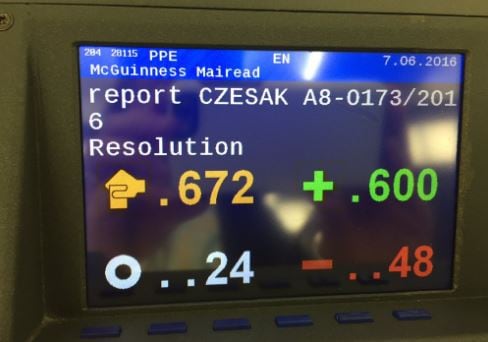With 600 votes for, 48 against and 24 abstentions, the vote - although non-binding - sends a signal to the European Commission that legislative action is required.
Drafted by the Committee on the Internal Market and Consumer Protection (IMCO), the resolution calls on the Commission to take action against UTPs that occur at a business-to-business level. Unlike business-to-

consumer transactions, this is not currently provided for under EU law.
Examples of unfair trading practices (UTPs) include suddenly cancelling contracts without any justification; unilateral changes to contacts, delaying payments; restricting access to the market or offloading transport or storage costs onto the supplier.
“Commercial relationships between these companies usually work reasonably well,” said Agriculture Commissioner, Phil Hogan.
“What we need to avoid is companies abusing large differences in bargaining power to apply unfair trading practices […] I fully agree with you that this is not acceptable.”
President of the Irish Farmers' Association Joe Healy welcomed the result and said he will be discussing the result next week at a meeting of the Committee of Professional Agricultural Organisation's (COPA).
But not everyone wants more legislation. The French Retail Federation (FCD) said on Twitter ahead of the vote: "EU law on UTPs cannot solve [the] agri-crisis. Problems are due to lifting quotas, decreased imports, world markets and changing eating habits."
Commission 'reflects' on result
A spokesperson for the Commission told FoodNavigator it was "reflecting in detail" on the resolution passed by the Parliament, including the amendments made. "We need to work with the Parliament, with the Member States and the stakeholders on how best to progress this important issue and together to focus on actions that can truly make a change and add value."
According to the resolution text, UTPs are fuelling overproduction of food and food waste in the bloc, and leave farmers, SMEs and microenterprises that make up 90% of the EU’s economic fabric, most at risk. Consumers are affected through a loss in product diversity, cultural heritage and fewer retail outlets.
Legislation is necessary because those affected by UTPs are often unable to speak out, the Members of European Parliament (MEPs) said.
"The ‘fear factor’ comes into play in commercial relationships, with the weaker party being unable to make effective use of their rights and unwilling to lodge a complaint about UTPs imposed by the stronger party, for fear of compromising their commercial relationship,” reads the resolution.
The Commission did not respond in time for publication of this article.
